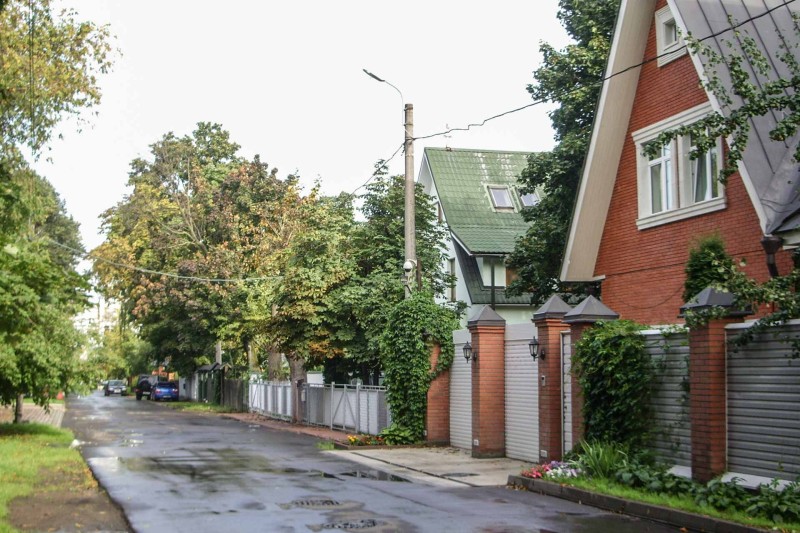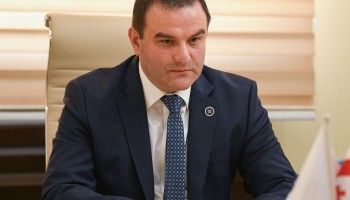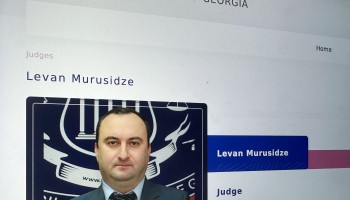Georgian billionaire Bidzina Ivanishvili, often described as the country’s informal ruler, swore he would sell his Russian businesses and revoke his Russian passport when he created the political party Georgian Dream in 2011.
However, reporters have found that Ivanishvili’s wife has continued to expand her personal holdings in Russia, making a new acquisition as recently as this year. Her previously unreported assets consist of a second home and two adjacent plots of land near Peredelkino, an elite dacha settlement outside Moscow. A company linked to Ivanishvili owns another 2.7 hectares of adjacent land.
Based on the prices of comparable properties, reporters estimate all of this real estate to be worth at least $14.7 million in total.
Ivanishvili declared his family’s first Russian residence — a large house in an upscale Moscow district once home to painters and artists — in a 2013 asset filing, when he was prime minister. It is registered to his wife, Ekaterine Khvedelidze, and son, Uta Ivanishvili.
The Ivanishvilis’ Moscow home is on Savrasova Street in the Sokol district, which is known for its green spaces, distinctive architecture, and high prices.
According to newly unearthed documents, that house is now being rented out, with the revenue appearing to accrue to Khvedelidze through a Russian bank sanctioned in the West.
“[His new properties] once again confirm the fact that he never stopped contact [with Russia],” said Nino Evgenidze, executive director of the Economic Policy Research Center, a Georgian think tank. “We were assured that he has nothing in Russia, and is not connected in any way. “This once again demonstrates that we, representatives of Georgian NGOs, were right when we argued that such a danger exists.”
Ties to Russia are politically sensitive in Georgia, given its history of forceful incorporation into the Russian empire and Soviet Union. Today the Russian military occupies two territories, Abkhazia and South Ossetia, that are internationally recognized as Georgian but are ruled by separatist leaders. In 2008, the two countries fought a war that left hundreds dead and tens of thousands displaced. Diplomatic relations remain frozen today.
More recently, Ivanishvili’s party, Georgian Dream, has been accused of attempting to turn the country away from the West. Above all, the party’s introduction of a law that will force NGOs and media outlets receiving funds from abroad to register as “foreign agents” has stirred up fears that Georgian Dream will take the country along the same repressive path as Russia. A similar law in Russia has been used to target independent activists and journalists.
The government’s repeated efforts to advance the law stirred intense protests and aggressive police crackdowns in the capital, Tbilisi, first in 2023 and again this spring.
When Ivanishvili made a rare public appearance this year to defend the law, he inveighed against domestic NGOs as tools of a hostile West seeking to undermine Georgian sovereignty. His aggressive speech shocked foreign observers and seemed to mark an end to the ambition of Georgia’s ruling party to join the European Union. As if to make the point final, the controversial law was passed this May, despite continued fierce protest.
Its adoption drew sharp responses from the country’s traditional foreign partners. The EU has formally halted Georgia’s accession process, while the United States has paused joint military exercises and restricted visas of Georgians “responsible for or complicit in undermining democracy.” A separate act in the U.S. congress envisages further sanctions; it is expected to be enacted ahead of a crucial Georgian parliamentary election to be held in October.
Meanwhile, new information about Ivanishvili’s remaining ties to Russia has continued to emerge. In 2022, the Georgian chapter of Transparency International revealed that Ivanishvili owned a Russian company through an offshore structure in the British Virgin Islands.
Back then, nothing about the activity of that company, called Aqua Space, was known. Now, financial records obtained by reporters reveal that it recorded a profit of nearly 71 million rubles (approximately $800,000) in 2023.
Part of Aqua Space’s profits came from monthly rent payments the company collected from the tenant of the Ivanishvili family’s Moscow home. On the same days each month, it transferred much of this money — the equivalent of nearly $94,000 in total since 2023 — to Khvelidze’s bank account at the Russian bank VTB.
In addition, records show, Aqua Space earned interest from regularly making multi-million-ruble short-term deposits at Sberbank.
This activity strongly suggests that Aqua Space still belongs to Ivanishvili or his family, though up-to-date offshore records are not available to verify his continued ownership of Vanity Overseas Limited, the BVI company through which he held it.
Sberbank and VTB are two of Russia’s largest banks and are majority state-owned; they have been sanctioned by the United States since Russia’s full-scale invasion of Ukraine in 2022.
According to records obtained by reporters, Aqua Space also owns 2.7 hectares of “recreational” land near Peredelkino outside Moscow, not far from the family’s second house. Reporters estimate the value of this land to be about $2.7 million.
These properties in Izmalkovo, a settlement outside Moscow, belong to Ivanishvili’s wife and a company linked to Ivanishvili. Ivanishvili had declared the three older plots that belong to his wife. The newer three, and a house that stands on one of them, have not been disclosed.
Reporters were not able to learn whether anyone from Ivanishvili's family lives at the second home outside Moscow, or whether it is rented out to anyone. Before being acquired by Ivanishvili’s wife, it was owned by Ucha Mamatsashvili, the oligarch’s cousin and close confidant.
Ivanishvili, his wife, and his son did not reply to requests for comment.
TI Georgia contributed research support.








